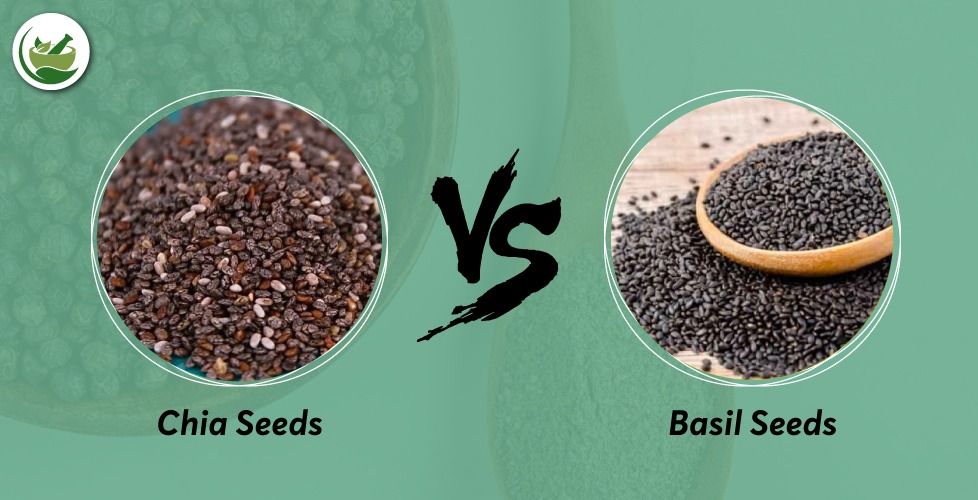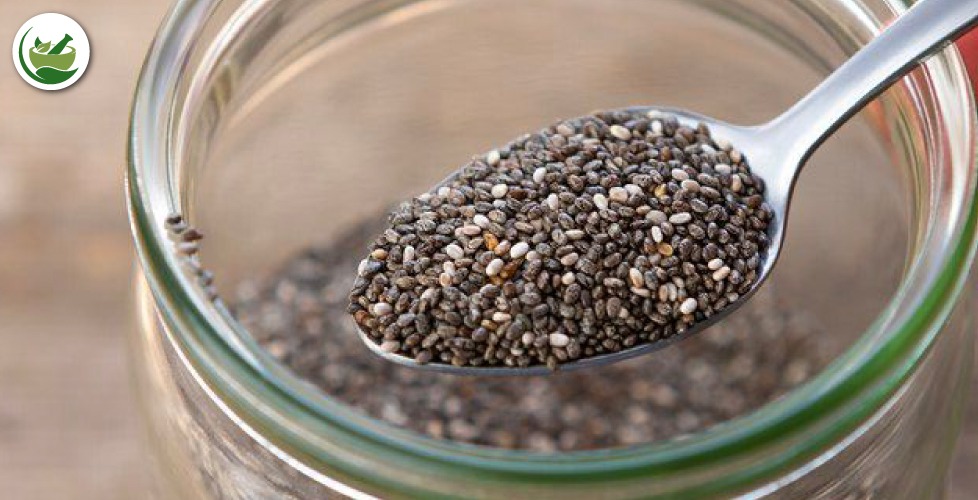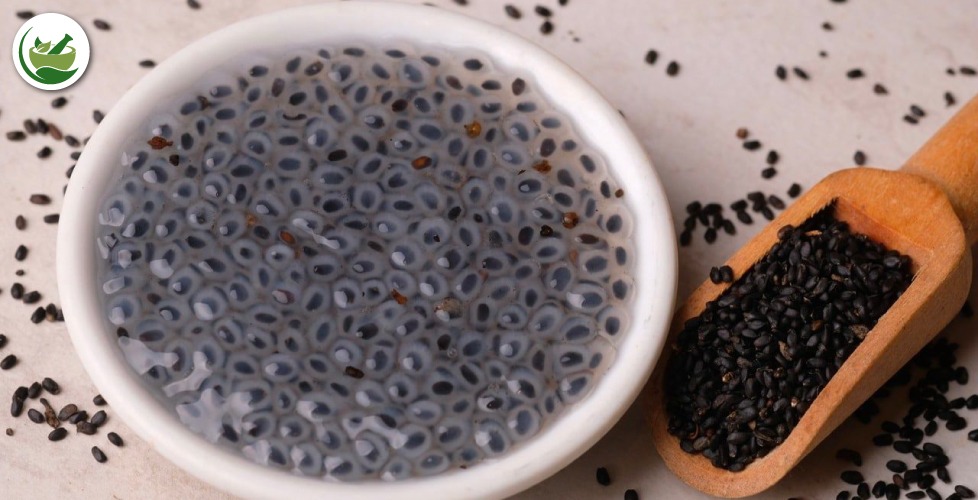
In the search for healthy living, superfoods have received a lot of attention due to their nutrient-dense profiles and possible health benefits. Chia Seeds vs Basil Seeds stand out due to their flexibility and high nutritional value. Recognizing the distinct advantages of both seeds in talks about healthy foods can help people make more educated dietary decisions.
This blog post explores the nutritional content and health benefits of Chia Seeds vs Basil Seeds, giving a thorough comparison to help you improve your diet.
Chia seed benefits

Nutritional Profile:
- Omega-3 Fatty Acids: Chia seeds are one of the richest plant-based sources of ALA (alpha-linolenic acid), which is crucial for heart health and cognitive function.
- Fibers: With nearly 11 grams of fiber per ounce, chia seeds promote a feeling of fullness, reduce appetite, and support a healthy digestive system.
- Proteins: Offering a high-quality plant protein content, they are essential for muscle repair and growth, particularly beneficial for vegetarians and vegans.
- Minerals: Rich in calcium, magnesium, and phosphorus, chia seeds support bone health, muscle function, and energy metabolism.
Health Benefits:
- Cardiovascular Health: The omega-3s and fibers help reduce cholesterol levels, decrease blood pressure, and lower the risk of heart disease.
- Weight Management: The protein and fiber aid in reducing appetite and calorie intake, supporting weight loss efforts.
- Hydration and Electrolyte Balance: When soaked, chia seeds absorb 10–12 times their weight in water, aiding hydration and maintaining electrolyte balance.
Basil seed benefits

Nutritional Profile:
- Fibers: Comparable to chia seeds in fiber content, they support digestive health and aid in weight management.
- Antioxidants: Rich in flavonoids and other antioxidants, basil seeds protect against oxidative stress and inflammation.
- Plant Compounds: They contain compounds like terpenes, which have cooling and soothing properties.
Health Benefits:
- Blood Sugar Control: The high fiber content can help manage blood sugar levels, which is beneficial for diabetes management.
- Digestive Health: Like chia seeds, the gel-forming property of basil seeds aids in bowel regularity and gut health.
- Cooling and Soothing Effects: Traditionally used to relieve stomach upset and reduce body heat during hot weather.
Comparative Analysis
When comparing chia seeds and basil seeds, it’s essential to highlight both their nutritional differences and the distinct health benefits they provide. This comprehensive comparison will help you understand how each seed contributes to overall health and wellness in unique ways.
Nutritional Differences
Omega-3 Content:
- Chia seeds are an excellent source of omega-3 fatty acids, particularly alpha-linolenic acid (ALA), which is essential for heart health, reducing inflammation, and supporting cognitive functions. This makes chia seeds particularly beneficial for those looking to improve their cardiovascular health and mental well-being.
Antioxidant Levels:
- Basil Seeds: Although both seeds contain antioxidants, basil seeds have a higher concentration of certain types, such as flavonoids and polyphenols. These antioxidants are crucial for combating oxidative stress and cellular damage, potentially reducing the risk of chronic diseases, and supporting overall health.
Health Differences
Cardiovascular Health:
| Chia Seeds | Basil Seeds |
| Due to their high ALA omega-3 content, chia seeds can help reduce cholesterol levels, decrease blood pressure, and lower the risk of heart disease. They also have a positive effect on reducing inflammation throughout the body, further supporting cardiovascular health. | While also beneficial for heart health, the primary cardiovascular benefit of basil seeds comes from their high fiber content, which can aid in lowering bad cholesterol levels and maintaining heart health. |
Digestive Health:
| Chia Seeds | Basil Seeds |
| The fiber in chia seeds not only aids in bowel regularity but also works as a prebiotic, feeding the beneficial bacteria in the gut and supporting a healthy microbiome. This can lead to improved digestion and a lower risk of digestive disorders. | Like chia seeds, the high fiber content in basil seeds supports digestive health by promoting regular bowel movements. However, basil seeds have been traditionally used to treat stomach upsets and bloating, offering a soothing effect on the digestive tract |
Blood Sugar Management:
| Chia Seeds | Basil Seeds |
| The combination of high fiber and protein in chia seeds can help stabilize blood sugar levels by slowing down the rate at which carbohydrates are digested and absorbed. This makes them a good alternative for people who have diabetes or want to control their blood sugar levels. | Basil seeds’ ability to reduce blood sugar spikes after meals is particularly noted for its effectiveness in managing type 2 diabetes symptoms. Their gel-forming fiber delays carbohydrate digestion and absorption, like chia seeds, but may have a more pronounced effect on blood sugar levels due to their unique composition. |
Weight Management:
- Chia Seeds vs Basil Seeds: Both seeds are beneficial for weight management due to their high fiber content, which increases satiety and reduces appetite. However, chia seeds’ protein content adds benefit by helping to preserve muscle mass during weight loss, making them slightly more advantageous for those looking to lose weight while maintaining muscle.
Usage and Taste:
- Taste: Chia seeds have a subtle, nutty flavor, making them versatile in various dishes. Basil seeds have a mild flavor with a hint of basil and are often used in beverages and desserts for a refreshing taste.
- Culinary Flexibility: Chia seeds can be used in a broader range of recipes due to their neutral taste, from baking to thickening sauces. Basil seeds are preferred in recipes where a hint of basil flavor complements the dish, such as in lemonades, smoothies, and Asian desserts.
Incorporating into Your Diet
Chia Seeds:
- Add to breakfast cereals, smoothies, and yogurts.
- Use it as a thickener in soups and gravies.
- Mix with water to create a vegan egg substitute for baking.
Basil Seeds:
- Soak and add it to drinks for a cooling effect.
- Incorporate it into puddings, jellies, and desserts.
- Use it as a garnish on salads for added texture and nutrients.
Expanded FAQs
Q: How much of these seeds should I consume daily?
A general recommendation is 1-2 tablespoons of chia or basil seeds daily. However, start with a smaller amount and increase gradually to assess tolerance.
Q: Are there any risks associated with consuming chia or basil seeds?
In rare cases, consuming these seeds without adequate hydration can lead to intestinal blockage. Always soak or consume them with plenty of fluids.
Q: Can chia and basil seeds improve skin health?
Yes, their high antioxidant content can help combat oxidative stress, one of the culprits behind skin aging and damage.
Q: How do these seeds fit into a low-carb or keto diet?
Despite their high fiber content, both seeds have a low digestible carb content, making them suitable for low-carb and ketogenic diets.
Read more blogs on the benefits of Chia Seeds
Conclusion
In conclusion, Chia Seeds vs Basil Seeds are powerhouse ingredients that offer a wealth of health benefits. Their high nutritional value, rich in essential fatty acids, fibers, proteins, and antioxidants, provides a multitude of advantages for cardiovascular health, weight management, digestive well-being, and blood sugar regulation.
Whether you choose chia seeds for their omega-3 content and muscle-maintaining protein or basil seeds for their blood sugar control properties and cooling effects, integrating these superfoods into your diet can contribute to a healthier lifestyle.
Both are not only versatile in a culinary context, appealing to a variety of tastes and dishes, but also support a range of dietary needs, fitting seamlessly into low-carb and ketogenic diets.
As with any dietary addition, moderation is key, and it’s important to stay hydrated to maximize their benefits. By making these nutrient-dense seeds a regular part of your diet, you are taking a delicious step toward better health!






